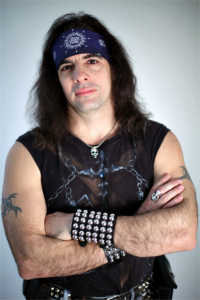Just over 100 miles separate The United States and Cuba. Yet, as history would have it, the two nations have carried on a messy and surprisingly limited relationship. Setting aside the geopolitics of the real world—for now—leaves us with a sadly restrained amount of cultural cross pollination. Stateside, Cuba’s strongest association is almost assuredly cigars, followed by pressed ham, pork, and Swiss cheese sandwiches, and in a distant third, there’s Ricky Ricardo, I’m guessing.
For as familiar and adoring as I am of Cuban sandwiches (let me emphasize: extremely), I had never read—or even knew of—any Cuban authors before this summer, which speaks to the unfortunate priorities of our cultural knowledge of our island neighbor. Great art can not be kept back for long, though, and a shiny new copy of Super Extra Grande fell into my hands one day as if it were fate.
Like most of you, I had never heard of Cuba’s Greatest Living Science Fiction Writer, Yoss.
The prolific author started writing in the 80’s and hasn’t slowed down since, running science fiction writing workshops to further the art in Cuba and everywhere else. Most reviewers have designated A Hitchhiker’s Guide to the Galaxy author Douglas Adams as Yoss’s Western analog, which is fairly apt, though I’d argue that he has more of of the spirit of Robert A. Heinlein (Stranger in a Strange Land, Starship Troopers).
Interpreting Yoss via our familiar paragons is a dangerous game, though, as we risk missing the differences and innovations of the Cuban science fiction tradition. Augustin De Rojas, then, is a better name to link with Yoss; known as the progenitor of Cuban science fiction, he shaped the literary future of the country with stories that distilled the sentiments and consequences of communism, equating the hardships of the isolated state to those of an imperilled spaceship crew far from home.
Oh, and in case it isn’t apparent enough, Yoss is also the lead singer of a heavy metal band, Tenaz. After listening to a few tracks, I can confirm that science fiction is indeed his mastercraft.
Super Extra Grande follows Dr. Jan Amos Sangan Dongo, better known as the “Veterinarian to the Giants.” These giants consist of enormous creatures from the depths of space, from Dune-esque monster worms to continent-sized amoebas. The book hits the ground running, opening with Sangan trudging through a beast’s digestive track.
Yoss pivots from the fascinating and at times gross biological details to framing his world with its cast of alien races and their overarching geopolitical (or more accurately, astropolitical) tensions. The world building comes quickly and is well engineered; each brushstroke feels unique and necessary. Sangan also manages to get embroiled in some compelling interpersonal drama. A precarious love triangle forms with his two assistants, one being human, the other an alluring Cetian. Yoss even squeezes in a poignant backstory, delving into the transformative college years of his protagonist. These characters have real, meaningful flaws that give them a tangibility that anchors the space-faring setting of the novel.
While crafting the scifi cloth of this world, Yoss reflects and comments on the social and political interworkings of our own world, showcasing his genre’s hallmark ability to explore our own problems through a new lens. There is nothing so heavy handed, but the dysfunctional and frankly awkward diplomacy of the different galactic races mirrors that of realty quite well. Spanglish has become the universal lingua franca, which functions perhaps as a jab at an anglo-dominated globe—it also may serve as a not- so-bold prediction.
Super Extra Grande impresses with so many facets and such depth for a 150 page novella. There’s a little something for everyone, and each element coalesces to form a masterwork worthy of the hype Yoss has received. Even if the political and interpersonal nuances are lost on you, hey, there’s still an adventure with ridiculously cool space monsters to nerd out over.
As reductive as it is, one could even liken the book to a delicious Cuban sandwich; the scifi imagination forms the core of rich pork shoulder, with humor and introspection acting as the pickles and mustard, cutting through with a balancing sharpness. An endearing yet imperfect cast of characters are the ham, adding a special sweetness that puts it over the top. And of course, it’s compacted into a well-finished vessel without any unused space, like a buttery telera roll made golden from a hot plancha.
No, sandwich metaphors are too easy. As great as Cuban sandwiches are, Super Extra Grande can’t compare. And that’s precisely why it’s so important to have writers like Yoss cross cultural boundaries; when it comes to sandwiches or scifi, I’ll pick this book every time. And that’s saying a lot. Ham is serious competition.
-Eli Hoelscher is a Readers’ Services Assistant at Lawrence Public Library.




Add a comment to: Is a Book a Sandwich? Super Extra Grande Edition